Sixteen years of Assassin's Creed.
With Mirage on the horizon, Ubisoft has promised a "back to basics" approach to their flagship franchise. But things are never that simple.
Hey!
Today, I wrote about the Assassin’s Creed franchise and how it has become the most unlikely of pop culture staples. As a fan myself, it was something I enjoyed looking back on.
But I get it - the series isn’t for everyone and neither are video games. And if that’s you, no worries! This post probably won’t be your cup of tea.
Stay tuned though - there is a lot coming to Off-Balance over the next few weeks, on a variety of topics and I am super excited to share it all with you soon.
Thanks for reading. Until next time,
Ryan.
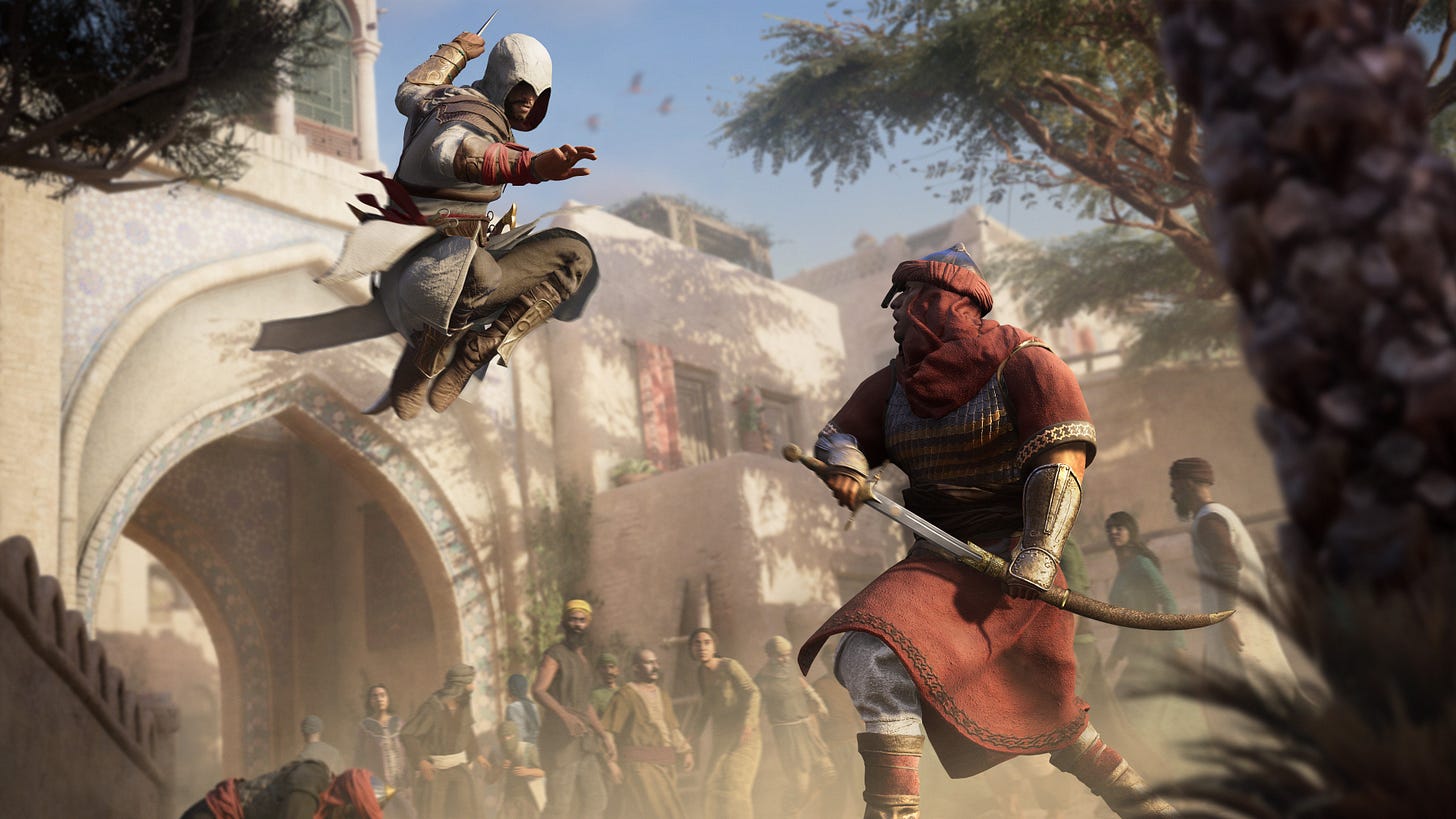
Ubisoft is putting in the work.
After months of relative silence, the French developer has amped up their marketing campaign for Assassin’s Creed: Mirage in recent weeks, the next entry in the long-running video game franchise. They’ve even locked in a release date: October 12th.
Highly-stylized trailers, behind-the-scenes interviews with the development team, slick social media branding.
It has all recalled the series iconography of old and points towards a return to the compact narrative and stealth focused structure which brought them acclaim (eventually: burnout) and for a time, made the franchise one of the biggest in gaming.
But will it be a Leap of Faith worth taking?
Mirage, a prequel to 2020’s Assassin’s Creed: Valhalla, will star actor Lee Majdoub as Basim Ibn Ishaq1, a small-time thief living in ninth-century Baghdad who is recruited into an ancient organization intent on fighting for the people’s freedom: The Hidden Ones (they won’t be known as the eponymous “Assassins” until centuries later).
Presumably, we’ll see Basim grow from a brash young recruit into the supporting character we first met in Valhalla - a dangerous man with mysterious secrets.

When the original Assassin’s Creed released in 2007 (!!), it wasn’t a given that it would become anything more than what it was but come 2023, we have a franchise (ready? Okay, deep breath):
Twelve mainline video games (and their numerous spin-offs).
Comic books, cookbooks, novels.
A travelling orchestra that performs the series iconic music.
Various short films and even a feature-length film! (although the less said there, the better. It seems only HBO, with The Last of Us, can adapt video game properties with any mainstream success - listen, I’m not getting paid to say this but I don’t really recommended watching that movie: our lives are only so long).
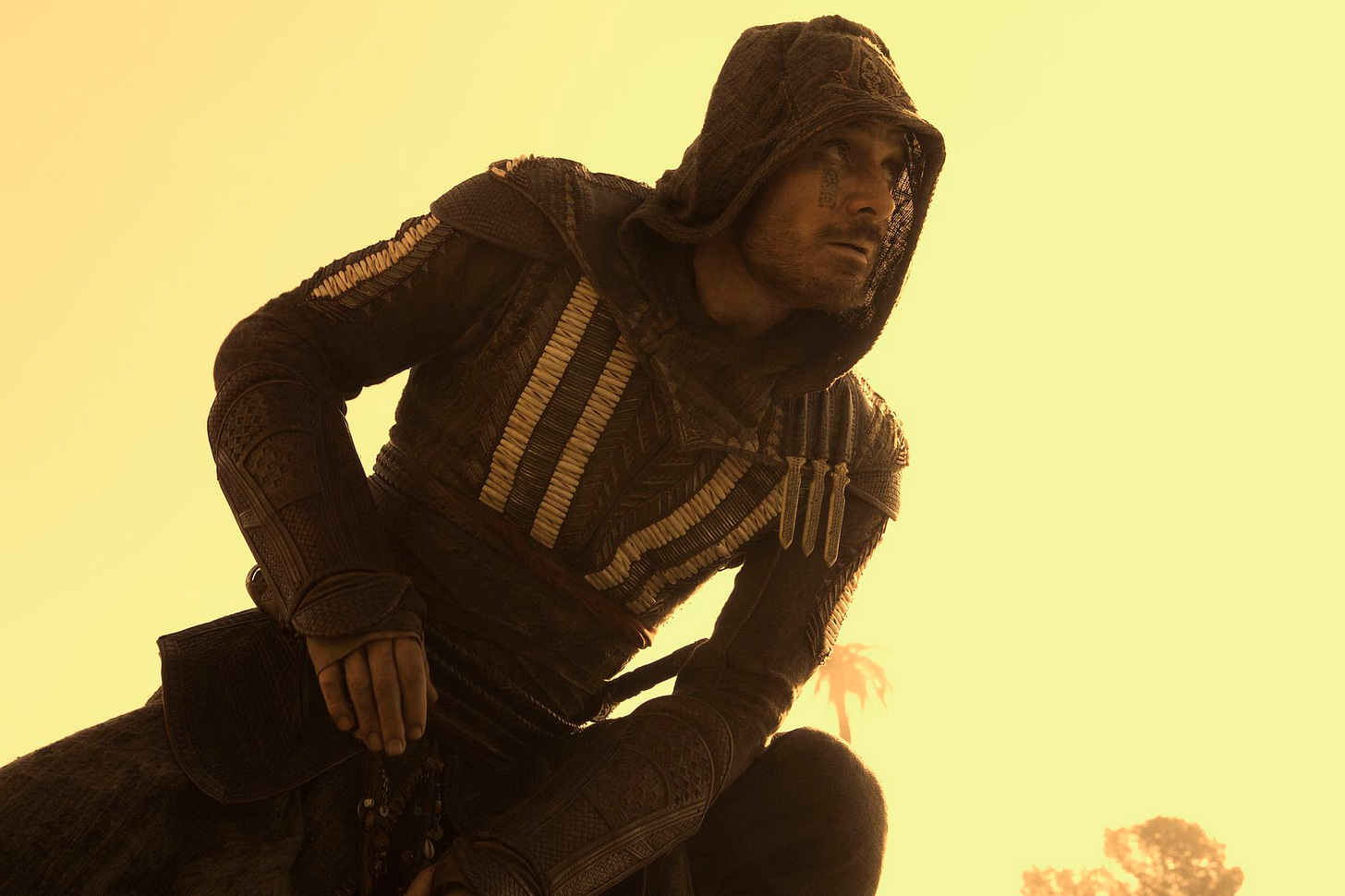
Anyway, if you’re not an avid gamer or even a casual one, all the above might seem a little mind-boggling: “Really? Really?! All that from a video game franchise?!”
The thing is, the medium has come a long way in the past fifteen or so years. Once taking inspiration from films and TV, now games are being adapted themselves, with prestige award shows, global recognition and the advent of performance capture, which has allowed actors to fully embody and bring their characters to life like never before.
But then, naturally, one might wonder, if this franchise is supposedly doing so well, riding high, why is Ubisoft putting so much stock in resetting the board?
Good question, reader.
I remember finishing the first game, the original Assassin’s Creed, and being well, a little gobsmacked.
It had this off-beat, sci-fi infused historical fiction angle, which was in such stark contrast to say, Call of Duty, which still used history as a storytelling backdrop, albeit, a little more bluntly: shoot it and shoot it again.
AC, though. It was different. Unique. Straight up weird.
While the story took inspiration from Vladimir Bartol’s 1938 novel, Alamut, which itself, drew from real-world history, that framework wouldn’t be enough to support what was to come or quite frankly, what already was.
History tells us that “the Assassins”, from the Arabic, Ḥaššāšīn, were indeed an organized, militarized group based throughout the Levant in the Middle Ages. Widely feared, they primarily undertook targeted killings against their political and religious opposition. Their ending was unceremonious: they were more or less destroyed by the invading Mongol Empire come the 13th century.
The game (later: games, plural) took those few breadcrumbs and ran with it, crafting history in their own image: The “Assassin Brotherhood”, in contrast to their real-world counterparts, were superheroes.
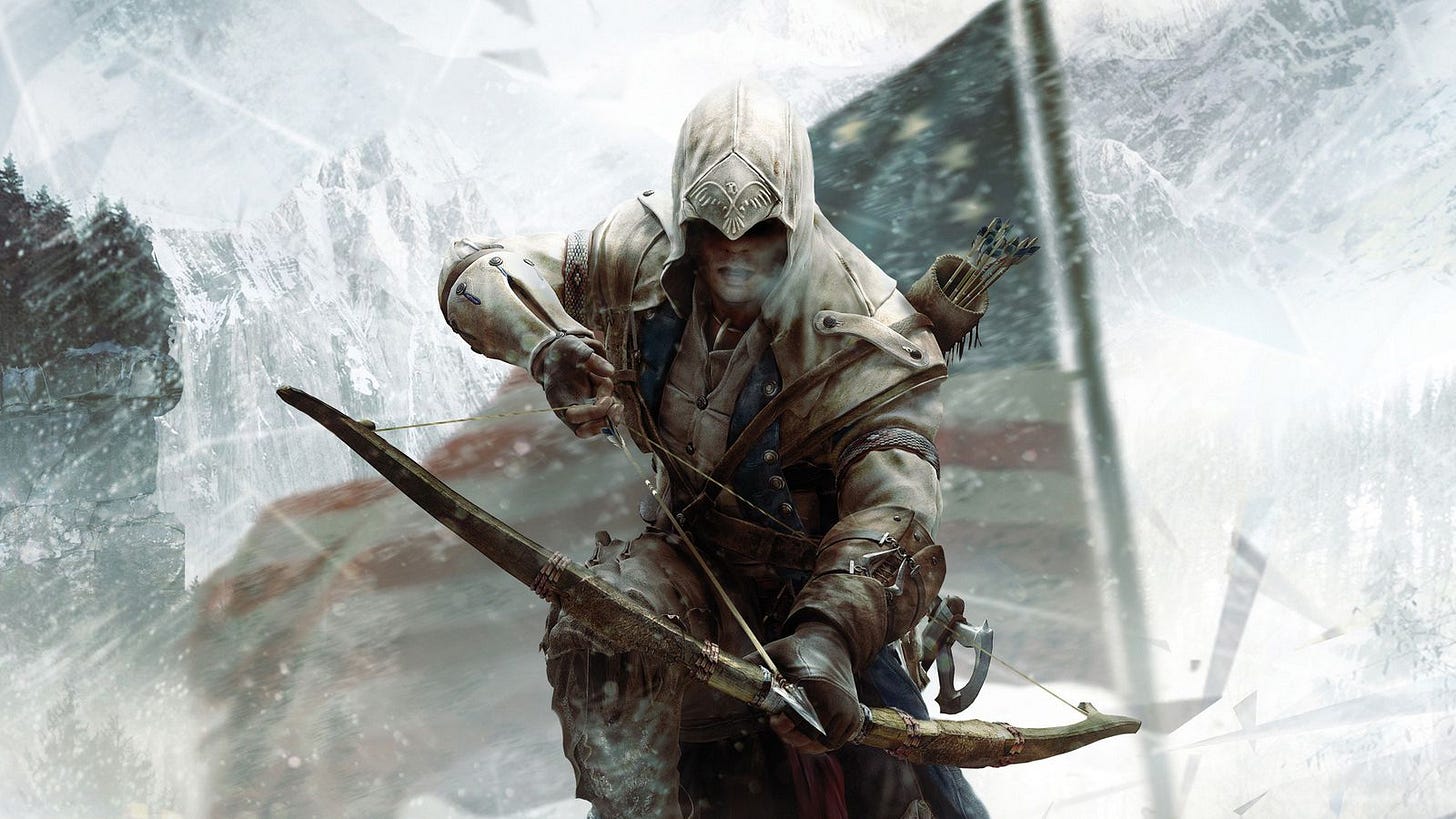
Working in the shadows, they were warrior-monks who followed a strict credo valuing innocent life, held philosophical debates with their targets as they died and sincerely believed themselves the champions of the common people - exactly how I feel at Boston Pizza after I’ve had too much to drink.
But while I’m opposed by BP’s hard liquor cut-off, the fictional Assassins were primarily opposed in their mission by their forever rivals, the Templar Order2, both groups, locked into a struggle over ownership of powerful ancient artifacts (“Pieces of Eden”) left behind by a long-ago super-species known as “The Isu” that created humanity.
Meanwhile, in the modern day, Assassin Desmond Miles (Nolan North) used a machine called “The Animus” to relive the lives of his ancestors, hoping their memories would hold the key to stopping the long-prophesied 2012 apocalypse.
You get all that? No? Yeah, you should’ve grabbed a pen.
As impossible as it might seem… it worked. And not only was it successful, people were hooked. I was hooked. There was no stopping after that: the sequels, the ever-expanding universe, it came with speed and it came with a vengeance.
But it came at a cost too.
I don’t think Ubisoft ever once intended these games, this franchise, to carry on as long as it has. Not really.
The first five games (and to an extent, the sixth as well) were all apart of one overarching arc.
And while Desmond’s story in the modern day was never as exciting compared to what his ancestors were up to in the past, (“disinterested” is not what you want for someone who is trying to stop the planet from getting overcooked like a S’mores marshmallow by a massive solar flare but whatever) there was a consistency to it all, something being built, refined, improved upon.
Something that was reflected in the moment-to-moment gameplay too.

The games were relatively brisk, twenty to thirty hour affairs at most, as you moved through a city (or several) and brought justice to the streets.
There were forgotten tombs to discover and explore, long-ago manuscripts to decipher and armour to find. You had similar tools at your disposal (the Hidden Blade, throwing knives, smoke bombs) and instead of tackling combat head-on, you were often encouraged to take to the rooftops or to hide amongst a crowd.
It worked and it all worked very well but for better or worse, it quickly became familiar even if the storytelling and game-by-game experimentation worked hard to uniquely elevate each individual experience: like the time you got into a fist fight with The Pope in the bowels of the Vatican. Yes, I’m serious (slack-jawed the entire time, all these years later, I still can’t believe they actually got away with that).
Desmond’s arc concluded in Assassin’s Creed III, more or less bringing an end to that era of the modern day story.
(While later games would have modern day segments that functioned as an extended epilogue of sorts, Ubisoft would eventually tie-off many of the loose narrative threads in comic books nobody read which is… certainly one kind of choice: a bad one - even the end of Shameless had more creative integrity and they had William H. Macy turn into a balloon).
Instead, going forward, our time was spent almost exclusively with our various historical protagonists - leaving that portion of the games to do even more heavy lifting.
And Black Flag did its damndest, further building upon III’s greatest innovation, the naval combat system. While III’s seafaring sections were siloed, only accessible through a series of menus and loading screens, Black Flag allowed players to freely roam a slice of the Caribbean as Edward Kenway (Matt Ryan), a privateer-turned-pirate (and later Assassin) looking to make his fortune during the Golden Age of Piracy.
It was outstanding. So good, in fact, that the system was basically transplanted wholesale into the next game, Assassin’s Creed: Rogue, save for trading in the Caribbean for the North Atlantic.
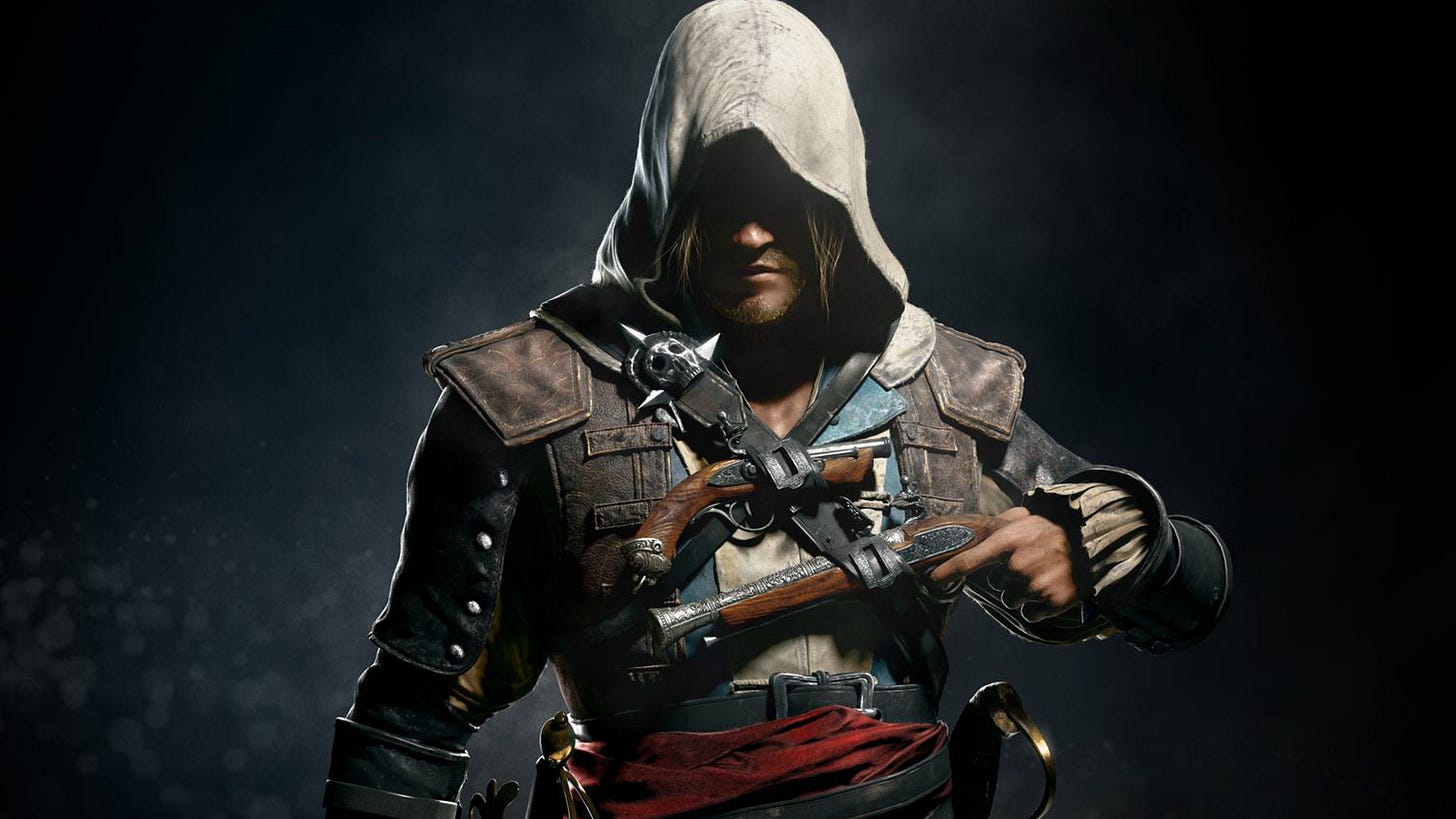
But the core, on-the-ground, gameplay loop was still intact: while not an Assassin proper for most of the story, Edward could still do everything a spider hooded rogue battling conspiracy could: which, for the player, meant a similar routine of tailing, eavesdropping and sneaking with few failsafes.
Complied with long-unaddressed technical issues, a traversal system that, while a massive step forward when it was introduced in II, had always been imperfect and continued combat of a little challenge. The familiar had started to become frustrating.
Now, despite all that, Black Flag received acclaim upon release and rightfully so (personally, IV, is one my favourite games in the series - the story is an all-timer for someone who grew up on pirate history) but for perhaps the first time, you could really start to see the franchise’s seams.
Assassin’s Creed: Unity (2014) was extensively promoted by Ubisoft.
A new game, a new era, on a new generation of hardware and a title befitting the French Revolution’s place in history.
Seemingly eager to address long-standing criticisms, the traversal and combat systems were completely rebuilt from the ground-up.
Instead of traversal being limited to a series of obvious, vertical routes, the new “downward parkour” system would allow players more freedom than ever before as they navigated Revolutionary Paris, the combat would be more challenging and the story was presented as a deep dive into a complex, narratively-rich historical period.
Instead, it almost immediately crashed and burned.
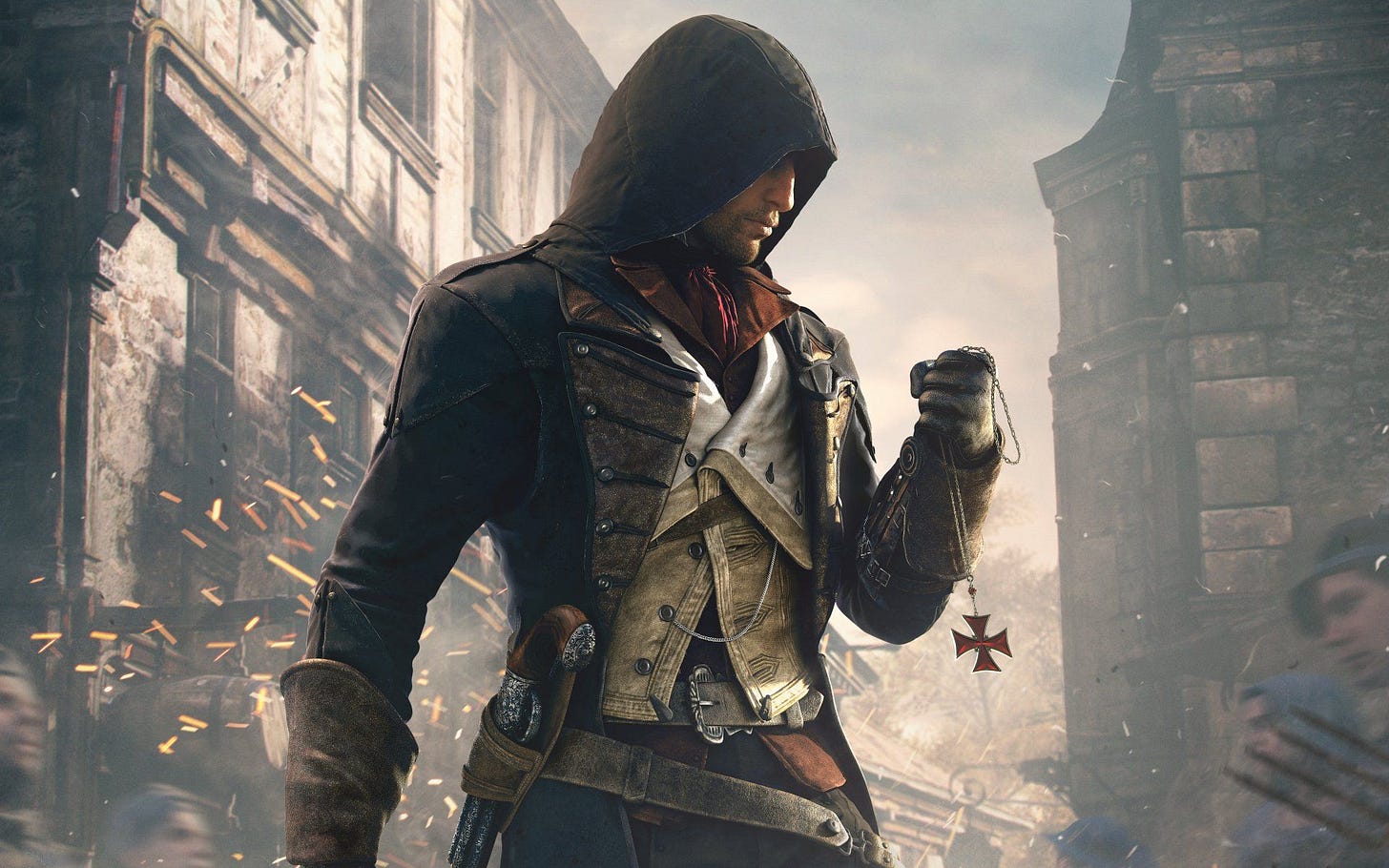
It has received something of a critical re-appraisal in recent years, something I venomously disagree with, if only out of spite.
It soars occasionally, there is no doubt (the countless YouTube Shorts out there highlighting the parkour system alone speak to that) and it is a visual spectacle, the view of all of Paris from the peak of Norte-Dame, is as impressive now as it was nine years ago.
But Unity was beset with a disastrous technical state at launch, that, while eventually patched, is still ridiculed almost a decade later (don’t click on that link if you want to sleep tonight) and a narrative, ultimately, that used the Revolution as little more than a backdrop to a love story that never got going.
From the outraged to the disenchanted, you could hear them all from the steps of Versailles.
Assassin’s Creed: Syndicate, Unity’s direct sequel, followed less than a year later.
You ever watched a movie or read a half-decent book, only to learn that the sequel was actually pretty good, better even, but guess what, you can’t be bothered?
That’s what happened to Syndicate.
Now, I like it, for what little that matters but you could tell that either Ubisoft was scrambling to recapture their previous form or maybe, like a vocal subset of their fanbase, they were just exhausted.
It wasn’t even close to being the series low point some make it out to be but it represented the effective end of era nonetheless.
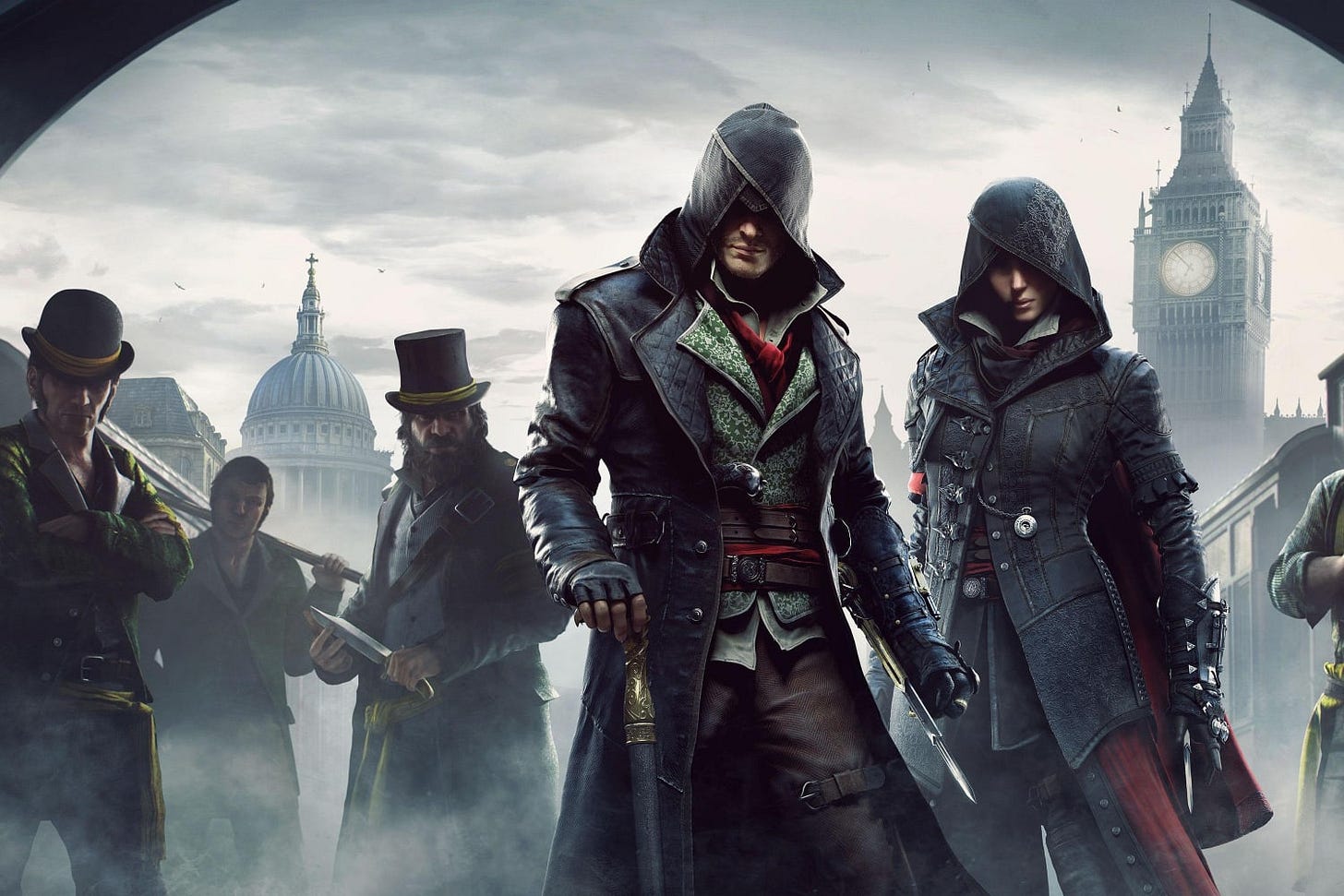
Reinvention seemed inevitable if the series was to continue: Ubisoft obliged.
Origins (2017), Odyssey (2018) and Valhalla (2020), vastly expanded the series scope - to the point that Black Flag’s free-to-explore Caribbean, still a remarkable achievement ten years later, seems quaint in comparison.
The tightly confined cities of Florence, Constantinople or Havana were a thing of the past. Instead, you were let loose on entire countries and encouraged, with the RPG-esque combat, to make your presence known - no longer a member of a secret society, why stick to the shadows?
You can’t blame them. To sustain any creative endeavour for that long, outside of maybe Grey’s Anatomy and whatever the hell the Paramount Network is doing, you can’t just play the hits on a loop forever.3
But in moving so far away, it seems, they’ve they ended up right back where they started.
I started Valhalla not long after its release in November of 2020 and wouldn’t see the end for two whole years.
Just like its two immediate predecessors, it was a massive video game not just on a technical scale but in sheer player investment too. Frankly, it was too damn much, enough so, that the game overplayed its hand, burdening itself with impossible expectations.
There were some definite highlights, of course.
Basim’s character work was a standout,the post-release expansions set in Ireland and France were enjoyable enough and the smaller side-story focusing on returning Odyssey protagonist Kassandra was, if we’re being honest, totally awesome.
And Cecilie Stenspil gave it her all as Valhalla’s protagonist, Evior, a battle-hardened Norse Viking, even if the overall narrative ultimately didn’t.

But by the time the credits finally rolled, leaving with a small teaser of what was to come with Mirage, I found myself staring down a total experience that was almost 350 hours.
Oh, you thought I mistyped? No, no.
350 HOURS.
That’s right.
THREE HUNDRED AND FIFTY HOURS.
Trying to wrap your head around that number? As a point of reference, it is about sixteen days. Like watching all 750 episodes of The Simpsons in one go.
Near the end, you could almost hear the game (and my PlayStation) straining against the very fabric of reality, as every aspect of the experience: the combat, the exploration, the overarching narrative, they all buckled under that mammoth weight.
On a base level, we’re veering into a broader conversation on the medium as a whole, on modern entertainment and how we consume it, the demon of live-service games, etc, etc but more specifically, we’re looking at a franchise that seems eager to course-correct (at least for now).
With Mirage, fans seem eager to see what Ubisoft, returning to the structure that brought them so much success, all those years ago, brings to the table. A thirty-hour experience. Smaller scope, smaller structure. Moment-to-moment gameplay that reflects their more modest beginnings.
So, after all this… am I excited?
Yeah, I think so. But to be perfectly honest, I find it impossible to truly separate that excitement from everything else going on at Ubisoft: primarily, overworked employees, mired in decade-long development hell and the continued house cleaning following allegations of sexual harassment at the company.
How much money they should one give, how much of their time should they reasonably invest, when they know that, despite the hard, too-often under-appreciated work of animators, designers, programmers and all those behind the scenes, their money will be lining the pockets of people they’d rather not support on a moral and ethical level?
I can’t make that decision for anyone but myself. On one hand, maybe the part of me that has been with the franchise since the very beginning, is just committed to “seeing it through”, as it were. Or maybe not. Drawing the line just that close, where I can acknowledge the issues facing the company and still contribute to it, I don’t know, it seems purposely naive, hypocritical and frankly, disrespectful.
Entertainment is one thing, standing behind your morals is another and try as one might, it is not always an easy scale to balance on.
But maybe, come October, those questions will be answered for us when Mirage hits shelves and we’ll see Ubisoft and the series as a whole, for what it always was: exactly that.
Replacing Carlos Rota, who portrayed the character in Valhalla.
Based on the historical Knights Templar, the military and banking order who were at their peak during the High Middle Ages. With a network stretching across Europe and the Holy Land, they quickly became one of the most powerful organizations in Christendom. But heavily indebted to the Order, Phillip IV of France, who held considerable sway with the Catholic Church, had Clement V work to forcibly disband them on his behalf, with members tortured into giving false confessions - their final Grand Master, Jaques De Molay, was burned at the stake in 1314 (a historical event that would later be depicted in the prologue of Assassin’s Creed: Unity). While both the Templars and the real-world Assassins did exist at the same time, far as I can tell, they probably never interacted as the Assassin’s Creed fictional history would have us believe.
Does Jon Taffer get tired of yelling like that? I sure get tired watching him - somebody, please, get that man a glass of water. Or some edibles.






